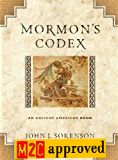 Let’s start with Mormon’s Codex, which Professor Terryl Givens claims is “the high-water mark of scholarship on the Book of Mormon.” Foreword, Mormon’s Codex, p. xvi.
Let’s start with Mormon’s Codex, which Professor Terryl Givens claims is “the high-water mark of scholarship on the Book of Mormon.” Foreword, Mormon’s Codex, p. xvi.
Well, let’s start with Brother Givens. In the Foreword, he writes,
“Whether or not God spoke to Moses on Sinai, Jesus resurrected from the dead, or Paul wrote words given him by inspiration, no one doubts the Old World setting and ancient origins of the Old and New Testaments. Until such time as a preponderance of evidence provides comparable historical plausibility for the Book of Mormon’s ancient origin, no one can expect scholars to consider the book as anything other than a nineteenth-century cultural artifact. If such a time is to come, it will arrive in large measure through the efforts of John Sorenson, who has done more than any Latter-day Saint scholar to shift the terms of the Book of Mormon debates.”
This is the M2C or bust approach; i.e., you have to believe the Book of Mormon took place in Mesoamerica, and that the prophets are wrong about the New York Cumorah, or else you have to believe the Book of Mormon is fiction.
Brother Givens’ M2C or bust approach has two major fallacies that we must infer Brother Givens is fully aware of.
First, Brother Sorenson did not originate M2C and was not the first to focus on Mesoamerica. Both were the work of RLDS scholars in the late 19th and early 20th century. Sorenson simply adopted their approach, rejecting the teachings of LDS prophets in the process.
Sorenson’s innovation was re-interpreting the text to fit Mesoamerica (an audacious feat of circular reasoning) and then adding lots of footnotes to support his interpretation. This, we’re told, constitutes “the high-water mark of scholarship on the Book of Mormon.”
Regarding M2C scholarship, we have to agree with Brother Givens. But “high-water mark” is faint praise because Mormon’s Codex was already underwater in the sense that it specifically and intentionally repudiates the teachings of the prophets, as we’ll see below.
Second, for all of his scholarly work (Mormon’s Codex alone is 714 pages, plus Bibliography, Index, and Preface, with hundreds (thousands?) of footnotes, professional maps, etc.), the only debate Brother Sorenson has shifted is away from the teachings of the prophets about the New York Cumorah.
No non-LDS Mesoamerican scholar thinks the Book of Mormon describes Mesoamerican culture. M2C is completely unpersuasive to the experts.
Worse, fewer and fewer LDS members are convinced by M2C.
The Next Mormons contains survey data that show a rapidly declining belief in the historicity of the Book of Mormon among LDS Millennials that corresponds with the increasing prevalence of M2C.
Let’s be clear: thanks to the work of Brother Sorenson and his fellow M2C advocates at Book of Mormon Central, the Interpreter, BYU Studies, CES, COB, and their various other outlets, fewer and fewer members of the Church believe the Book of Mormon is “anything other than a nineteenth-century cultural artifact.”
_____
M2C cannot stand on its own merits.
To keep the M2C hoax on life support, the M2C intellectuals depend on censoring the teachings of the prophets and the evidence that supports those teachings.
The M2C intellectuals raise millions of dollars from unsuspecting Church members and pay fine young scholars to promote M2C on social media.
These tactics reveal the weakness of their M2C theory even among LDS who want to believe the Book of Mormon is an authentic history.
 |
| BYU fantasy map portraying the Book of Mormon as a myth |
Nevertheless, because of their positions of influence at BYU, these M2C intellectuals have persuaded BYU and CES to teach the Book of Mormon with the infamous fantasy map (derived from Sorenson’s M2C interpretation of the text) that reinforces the very problem Givens claimed Brother Sorenson was addressing.
To slightly paraphrase Brother Givens, thanks to M2C and these fantasy maps, “no one can expect LDS youth to consider the book as anything other than a nineteenth-century cultural artifact.”
It is an unmitigated disaster.
And yet, since the inflection point in the 1980s, M2C has replaced the teachings of the prophets.
The M2C intellectuals justify this because of “scholarship.” In upcoming posts, we’ll examine the scholarship to see whether it deserves to be elevated above the teachings of the prophets.
Source: Book of Mormon Wars

2 thoughts on “Illusion of scholarship – Mormon’s Codex part 1”
Surely we should believe the brilliant scholars who have given us that presently offered “fantasy map” found in CES Book of Mormon material –before the words of those very nice, but obviously not “BYU-trained-and-credentialed-Book of Mormon-Geography” L.D.S. Prophets! After all, the scholars are the ones who gave us that interesting map! The Prophets offered only their own witnesses and testimonies that the Cumorah of Mormon 6:6 was (and is) located in New York state! Our conclusions should be obvious! Now, if I can only find anyplace on earth that matches that lovely and colorful map.. . . . . . .
Perhaps we can see a silver lining in what Bro. Givens is saying…the way I read his statement, the interest that “Mormon’s Codex” has generated will eventually topple the M2C’s Great and Spacious building. When that happens, Bro. Givens is correct, we WILL have this book to thank. Keep on keeping on Bro. Neville!
Comments are closed.